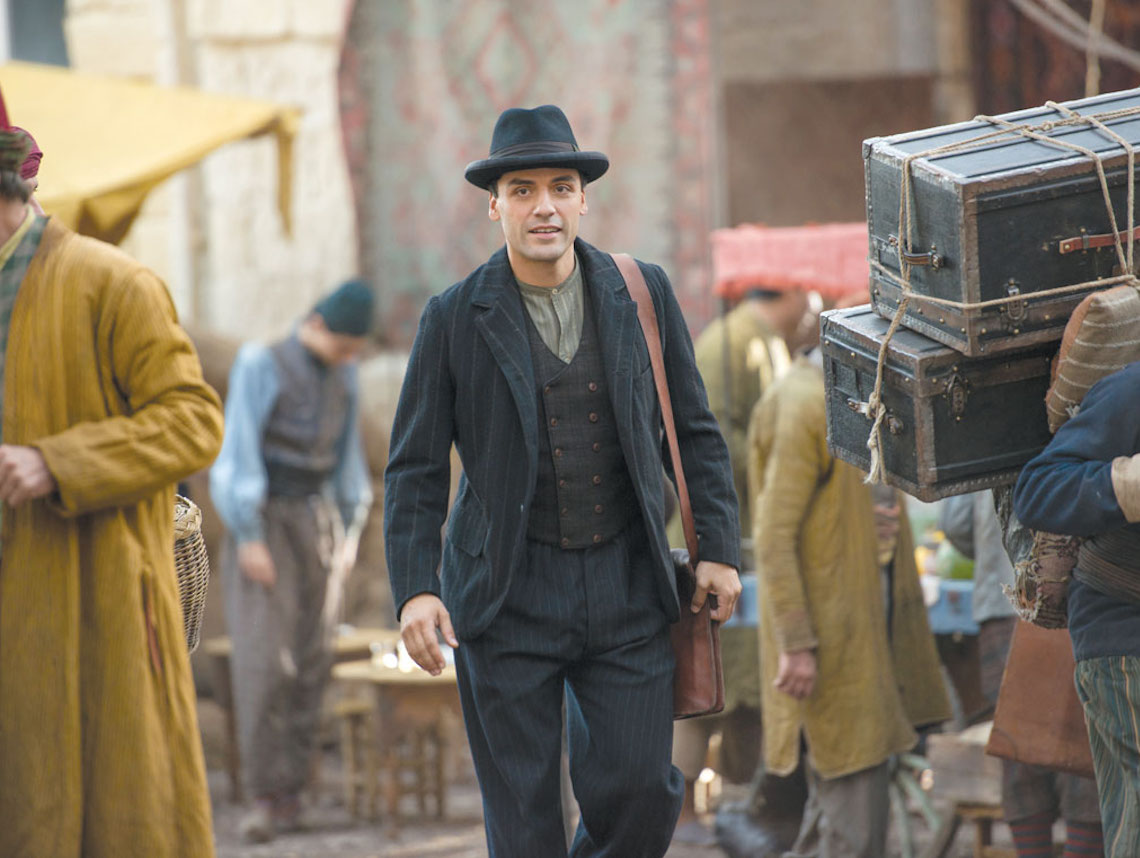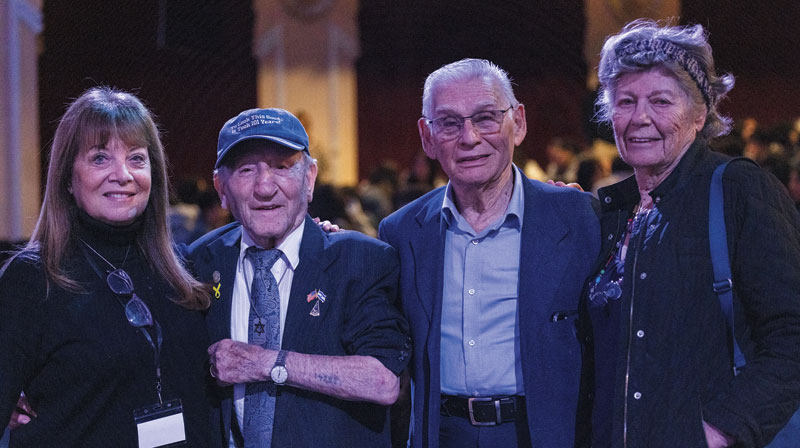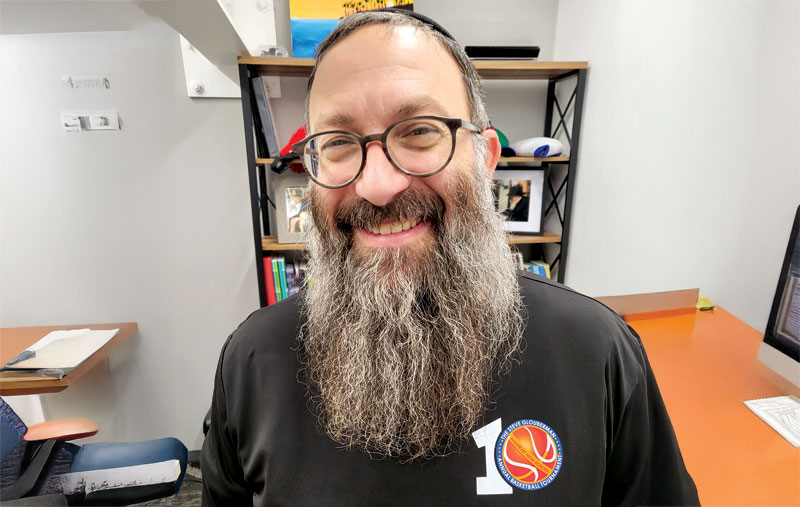
Speaking about the Holocaust, Elie Wiesel once asked, “Does there exist another way, another language, to say what is unsayable?” Perhaps there isn’t, but cinema comes pretty close. Movies tell stories about atrocities that are beyond the human psyche to grasp, forcing us as individuals and as a society to confront history that we would otherwise rather forget. Movies can be a witness to unspeakable events.
On April 21, one such movie finally makes it to the big screen. “The Promise,” a long-awaited, first-ever mass-market movie about the Armenian genocide, will be released in theaters across the nation. Starring Oscar Isaac, Christian Bale and Charlotte Le Bon, the film is a love story set in Ottoman Turkey in 1915 as the empire was coming to a rapid collapse.
Although there are numerous films that compel us to remember the horrors of the Holocaust, no such movie exists for the Armenian genocide. The annihilation of 1.5 million Armenians at the hands of the Ottoman Turks constitutes the first genocide of the 20th century. In fact, Raphael Lemkin, the Jewish lawyer and scholar of Polish-Jewish descent, coined the term “genocide” based on the Armenian massacres of 1915.
The Armenian genocide met every statute of the United Nation’s Convention on the Prevention and Punishment of the Crime of Genocide, adopted in 1948, and was recognized and defended by the International Association of Genocide Scholars — the main organization that studies genocides. Nevertheless, the Turkish government systematically denies the recognition. While many countries acknowledge the Armenian genocide, Turkey’s heavy-handed denials have prevented the United States, as well as Israel, from recognizing it as genocide. Their denial has nothing to do with fact or history, rather political expedience.
President Barack Obama made this very clear when he backtracked on his campaign promise to recognize the Armenian genocide.
“I have consistently stated my own view of what occurred in 1915, and my view has not changed,” he said. His views were that the Armenian genocide is not an allegation, a personal opinion or a point of view, but rather a widely documented, undeniable fact supported by an overwhelming body of historical evidence. Forty-five U.S. states recognize the Armenian genocide along with most foreign governments.
Nevertheless, after eight years in office, Obama refused to describe the killings of the Armenians as genocide.
The Armenian community has for a long time demanded a political recognition of the genocide by the U.S. While such a political resolution may be appropriate, it might not embed the tragedy into our popular consciousness as a film might, bringing to the screen the cold, hard facts of history.
“The Promise” is not the first film about the Armenian genocide, but it is the first large-scale film of the events. Films such as Fatih Akin’s “The Cut” (2014), Atom Egoyan’s “Ararat” (2002) and Henri Verneuil’s “Mayrig” (1991), featuring Omar Sharif, are beautifully and masterly told stories of the personal and generational effects of the horrors of history, but they are auteur films with limited reach.
Perhaps only a movie of sweep and stature like “The Promise” can break a brutal and vicious silence of the double-edged pain of the Armenian nation, both the experience of the crime and the denial of the crime.
In “The Promise,” Isaac portrays Michael, a medical student who leaves his village of Sirun in Anatolia for Constantinople (modern-day Istanbul) at the brink of World War I. Although he is promised to a woman in his village whose dowry pays for his studies, he falls in love with Ana (Le Bon), an Armenian woman from Paris. But Ana is involved with Chris (Bale), an American journalist with The Associated Press, who is dedicated to exposing the Turkish government’s horrors and galvanizing his government to take action.
The love triangle plays out against the broad sweep of history, as the Ottoman Empire comes to a rapid collapse and genocide ensues.
To viewers of Holocaust movies, many of the scenes will seem disturbingly familiar. Michael tries to free deportees from cattle cars, spends time as a forced laborer among sadistic guards and comes across killing fields of slaughtered innocents. Although the movie doesn’t make the connection, Hitler himself did: If people didn’t care while the Armenians were being slaughtered, he once wrote, they surely wouldn’t care about the Jews.
Actor James Cromwell plays United States Ambassador to the Ottomon Empire Henry Morgenthau, one of the rare people who did care. Morgenthau documented the genocide and implored the Woodrow Wilson government to take action. In one of the film’s most resonant scenes, a Turkish official asks Morgenthau why he, a Jew, should care about the Armenians. Morgenthau shoots back that his people know what it is like to be refugees.
It was the desire to bring the Armenian genocide to mass consciousness that brought “The Promise” to the big screen. Before he died, Kirk Kerkorian, former owner of MGM and an Armenian American, entrusted Eric Esrailian, a Los Angeles physician and close friend, with making the movie. Kirkorian requested that it would be an old-fashioned epic; have a love story; and include the rescue of the Armenians of the village of Musa Dagh by the French navy.
Esrailian sought the help of veteran producer Mike Medavoy (“Black Swan”) and tapped Terry George (“Hotel Rwanda”) as writer-director, with Robin Swicord (“The Curious Case of Benjamin Button”) as co-writer.
According to Esrailian, this was a passion project for many involved in the film. George had a keen knowledge of the Armenian genocide, having studied it while writing “Hotel Rwanda.” Medavoy, who is Jewish, was drawn to the project by the shared history of genocide.
The filmmakers remained true to Kerkorian’s vision: “The Promise” is a love story at heart, but the plot stays true to historical detail, including Turks who risked their lives to save their fellow Armenian countrymen, the New York Life Insurance Co. policy that an Ottoman ruler demanded from Morgenthau, and German culpability.
Movies not only compel compassion, they propel action. Just as “Schindler’s List” advanced our understanding of the Holocaust, etching its atrocities in our collective conscience, “The Promise” should do the same for the Armenian genocide. Holocaust movies are made so we won’t risk the loss of memory. “The Promise” was made to reassert that which has been systematically erased from our memory.
The Armenian genocide has long been omitted from Turkish academic books. One would be hard pressed to find a reputable scholar inside or outside of Turkey today who doesn’t acknowledge the events of 1915 as genocide. Yet students in Turkey continue to learn an altered version of history that’s contradictory to facts.
After the failed coup in Turkey last summer, president Recep Tayyip Erdogan purged the education ministry, expelling 15,000 students and 1,577 university deans. To control education is to control the mass mind, which is why movies like “The Promise” are essential. “The Promise” is a consequential film, first and foremost, for Turks.
To underscore their movie’s mission, the producers have created an interactive website (thepromise.movie) that provides more information about the atrocities of 1915. The website has a historical overview of the Armenian genocide as well as a timeline of all modern-day genocides. And since history is the documentation of experience, survivors or families of survivors from Yazidis in Syria to Jews worldwide can upload their personal stories on the website for documentation.
Ultimately, “The Promise” is about breaking the silence and dismantling the systematic machinery that would like us to stay ignorant or to forget. Where governments fail us, art can deliver, attaining something much greater than a political recognition and reaching into the hearts and minds of the masses.






















 More news and opinions than at a Shabbat dinner, right in your inbox.
More news and opinions than at a Shabbat dinner, right in your inbox.